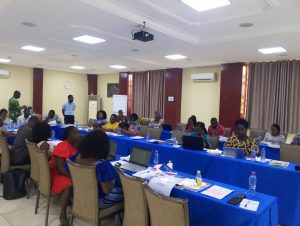A Public Health Expert and Programmes Manager , Non Communicable Diseases Unit of the Ghana Health Service , Dr Efua Commeh has intimated that the Ghanaian public need to take an audit of their food consumption habits and lifestyle choices amidst a surge in non communicable diseases in the country which is a source of worry particularly in the youthful and economically active sections of the population.
Her call comes on the back of the rising cases of Non Communicable Diseases being rampant of late in terms of cases being reported on the various health facilities across the country and its attendant effect on the health budget of the country.
The occasion for her concerns was the sensitization workshop on meat consumption habits among Ghanaians and its related health issues organized by a non for profit and non governmental organization , Communication for Initiatives (CIC) which sought to train journalists on the concept of “Meatless Monday” which is a global campaign to reduce meat consumption habits globally and to advocate for consumption of plant based proteins as an alternative to intake of red meat atleast o one day of the week and serve as an incentive to promote healthy eating among the Ghanaian public.
The workshop which was held on September 17,2024 drew participation from select media houses from the top meat consuming regions of the country with a focus on training the media personnel to use their mass communication channels to educate the citizenry on the benefits of reducing dependence on meat products (red meat).
Speaking as a Focal Person at the event, Dr Efua Commeh revealed that checks indicate that hypertension , strokes ,diabetes count among the topmost reported NCDs in the country and unbridled meat consumption and challenging living conditions have made it easier for the spread of non communicable diseases among the population and creates health problems for majority below the average earners in the economy .
Poor incomes in the country and across the continent makes people more susceptible to contracting NCDs due to inappropriate eating habits and the rising cost of food in the country with latest data in 2022 , showing that deaths in the health sector proved that NCDs accounted for 43% of mortalities in the country which even painted a grim picture of 45% in 2024 as eating habits decline in the nation .
” Globally , NCDs are on the rise due to alot of factors including poor eating habits coupled with declining incomes but the advanced nations are able to manage cases better compared to Africa where low incomes push people to choose convenience over rationality when it comes to food consumption and lifestyle choices as per example, the average Ghanaian will prefer to use gh5 to buy banku or kenkey as opposed including adequate amounts of fruits and vegetables in their meals.
With the less propensity of the typical Ghanaian to undertake medical exams , high risks of contracting silent killers like diabetes, strokes and hypertension which ravage through the population as shown by 43% of health sector mortalities being caused by NCDs in 2022 and rising by 2% in 2024 even when only half of the cases of NCDs are picked up by the health sector which is a massive worry for health professionals”.
Also. Dr Efua Commeh further added that lack of education in the country on when and how to test for NCDs in the population coupled with the ever declining lack of attention to proper dieting makes tackling avoidable rise in the disease burden in the country with an ever rising contraction case in the youthful population as opposed to years gone by where NCDs like Hypertension, diabetes and stroke as well as cancer which was the preserve of relatively older people of close to above 60 years is now rife in people as low as 18 years and sometimes below.
She added that hospital cases show that there are rising cases of childhood cancers in the country due to the factors she mentioned above where caretakers and parents lack proper education of noticing symptoms of likely incidence of cancer in children which includes symptoms like swellings around the face and joints , frequent drowsiness, and discoloured eyes are early warning signs in childhood cancers which must be reported early enough at the health facilities to ensure wholistic treatment before the cancers become terminal.
” It is worrying that a lack of proper education on NCDs and lack of adequate health professionals across board have made tackling the ever increasing cases in the population quite burdensome for health professionals and declining eating habits amidst rapid urbanization triggers more younger persons into contracting NCDs like diabetes, strokes and HBP as opposed to years ago when these circumstances were more acclimatised to persons 60 years and older in the country.
Thankfully , there are now more specialist treatment centres for early treatment in kids when it comes to childhood cancers and as such we must empower stakeholders like parents , the media and policy makers to be educated on the risk factors of emerging and existing NCDs with focused training on fishing out symptoms which include discoloured eyes ,swellings on joints , extended fever and the likes must report quickly at health facilities for effective treatment and case management particularly in terms of childhood cancers whic are now catered for by the NHIS programme through the instrumentality of the Vice President and health policymakers”.
Meatless Monday is a global movement that encourages people to reduce meat in their diet for their health and the health of the planet. The campaign was started in 2003 by Sid Lerner, the Founder of The Monday Campaigns, in association with the Johns Hopkins Center for a Livable Future.







